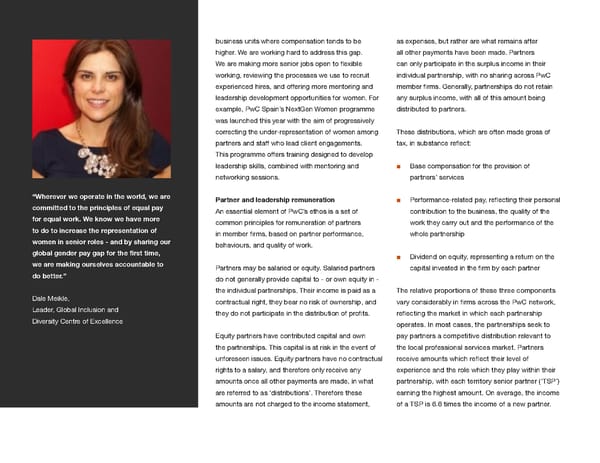business units where compensation tends to be as expenses, but rather are what remains after higher. We are working hard to address this gap. all other payments have been made. Partners We are making more senior jobs open to lfexible can only participate in the surplus income in their working, reviewing the processes we use to recruit individual partnership, with no sharing across PwC experienced hires, and offering more mentoring and member ifrms. Generally, partnerships do not retain leadership development opportunities for women. For any surplus income, with all of this amount being example, PwC Spain’s NextGen Women programme distributed to partners. was launched this year with the aim of progressively correcting the under-representation of women among These distributions, which are often made gross of partners and staff who lead client engagements. tax, in substance relfect: This programme offers training designed to develop leadership skills, combined with mentoring and ■ Base compensation for the provision of networking sessions. partners’ services “Wherever we operate in the world, we are Partner and leadership remuneration ■ Performance-related pay, relfecting their personal committed to the principles of equal pay An essential element of PwC’s ethos is a set of contribution to the business, the quality of the for equal work. We know we have more common principles for remuneration of partners work they carry out and the performance of the to do to increase the representation of in member ifrms, based on partner performance, whole partnership women in senior roles - and by sharing our behaviours, and quality of work. global gender pay gap for the ifrst time, ■ Dividend on equity, representing a return on the we are making ourselves accountable to Partners may be salaried or equity. Salaried partners capital invested in the ifrm by each partner do better.” do not generally provide capital to - or own equity in - the individual partnerships. Their income is paid as a The relative proportions of these three components Dale Meikle, contractual right, they bear no risk of ownership, and vary considerably in ifrms across the PwC network, Leader, Global Inclusion and they do not participate in the distribution of proifts. relfecting the market in which each partnership Diversity Centre of Excellence operates. In most cases, the partnerships seek to Equity partners have contributed capital and own pay partners a competitive distribution relevant to the partnerships. This capital is at risk in the event of the local professional services market. Partners unforeseen issues. Equity partners have no contractual receive amounts which relfect their level of rights to a salary, and therefore only receive any experience and the role which they play within their amounts once all other payments are made, in what partnership, with each territory senior partner (‘TSP’) are referred to as ‘distributions’. Therefore these earning the highest amount. On average, the income amounts are not charged to the income statement, of a TSP is 6.6 times the income of a new partner.
 Global Annual Review | PwC Page 38 Page 40
Global Annual Review | PwC Page 38 Page 40